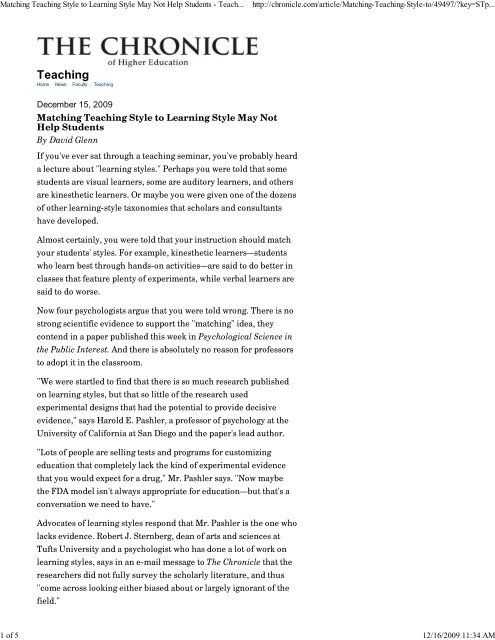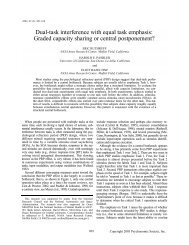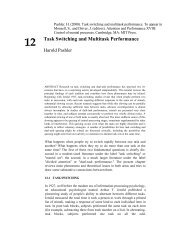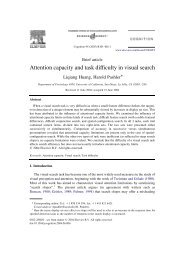Matching Teaching Style to ... - Learning Attention and Perception Lab
Matching Teaching Style to ... - Learning Attention and Perception Lab
Matching Teaching Style to ... - Learning Attention and Perception Lab
You also want an ePaper? Increase the reach of your titles
YUMPU automatically turns print PDFs into web optimized ePapers that Google loves.
<strong>Matching</strong> <strong>Teaching</strong> <strong>Style</strong> <strong>to</strong> <strong>Learning</strong> <strong>Style</strong> May Not Help Students - Teach...http://chronicle.com/article/<strong>Matching</strong>-<strong>Teaching</strong>-<strong>Style</strong>-<strong>to</strong>/49497/?key=STp...1 of 5 12/16/2009 11:34 AM<strong>Teaching</strong>Home News Faculty <strong>Teaching</strong>December 15, 2009<strong>Matching</strong> <strong>Teaching</strong> <strong>Style</strong> <strong>to</strong> <strong>Learning</strong> <strong>Style</strong> May NotHelp StudentsBy David GlennIf you've ever sat through a teaching seminar, you've probably hearda lecture about "learning styles." Perhaps you were <strong>to</strong>ld that somestudents are visual learners, some are audi<strong>to</strong>ry learners, <strong>and</strong> othersare kinesthetic learners. Or maybe you were given one of the dozensof other learning-style taxonomies that scholars <strong>and</strong> consultantshave developed.Almost certainly, you were <strong>to</strong>ld that your instruction should matchyour students' styles. For example, kinesthetic learners—studentswho learn best through h<strong>and</strong>s-on activities—are said <strong>to</strong> do better inclasses that feature plenty of experiments, while verbal learners aresaid <strong>to</strong> do worse.Now four psychologists argue that you were <strong>to</strong>ld wrong. There is nostrong scientific evidence <strong>to</strong> support the "matching" idea, theycontend in a paper published this week in Psychological Science inthe Public Interest. And there is absolutely no reason for professors<strong>to</strong> adopt it in the classroom."We were startled <strong>to</strong> find that there is so much research publishedon learning styles, but that so little of the research usedexperimental designs that had the potential <strong>to</strong> provide decisiveevidence," says Harold E. Pashler, a professor of psychology at theUniversity of California at San Diego <strong>and</strong> the paper's lead author."Lots of people are selling tests <strong>and</strong> programs for cus<strong>to</strong>mizingeducation that completely lack the kind of experimental evidencethat you would expect for a drug," Mr. Pashler says. "Now maybethe FDA model isn't always appropriate for education—but that's aconversation we need <strong>to</strong> have."Advocates of learning styles respond that Mr. Pashler is the one wholacks evidence. Robert J. Sternberg, dean of arts <strong>and</strong> sciences atTufts University <strong>and</strong> a psychologist who has done a lot of work onlearning styles, says in an e-mail message <strong>to</strong> The Chronicle that theresearchers did not fully survey the scholarly literature, <strong>and</strong> thus"come across looking either biased about or largely ignorant of thefield."
<strong>Matching</strong> <strong>Teaching</strong> <strong>Style</strong> <strong>to</strong> <strong>Learning</strong> <strong>Style</strong> May Not Help Students - Teach...http://chronicle.com/article/<strong>Matching</strong>-<strong>Teaching</strong>-<strong>Style</strong>-<strong>to</strong>/49497/?key=STp...2 of 5 12/16/2009 11:34 AMMr. Pashler's study does not dispute the existence of learning styles.But it asserts that no one has ever proved that any particular style ofinstruction simultaneously helps students who have one learningstyle while also harming students who have a different learningstyle.Of the hundreds of research papers that have been published onlearning styles, Mr. Pashler says, almost none have r<strong>and</strong>omlyassigned students in<strong>to</strong> one classroom type or another. Only thatkind of experiment, he says, can suggest anything definitive aboutcausation. And the few studies that have used an adequate researchdesign, he adds, have mostly failed <strong>to</strong> support the hypothesis thatteaching styles should match students' learning styles.More Alike Than DifferentConsider an experiment about teaching the structure of complexmolecules. The matching hypothesis might predict that kinestheticlearners would absorb the concept best by building ball-<strong>and</strong>-stickmodels in the lab, while verbal learners would do better by readinga few pages about the logic of molecular design.That sounds intuitive. But according <strong>to</strong> Mr. Pashler <strong>and</strong> hisco-authors, almost every well-designed study of that type hasdiscovered that one instructional style actually works best for bothgroups.What happens, Mr. Pashler says, is something like this:Experimenters r<strong>and</strong>omly assign students <strong>to</strong> a classroom that useslabora<strong>to</strong>ry lessons or <strong>to</strong> a classroom that uses texts. At the end of theweek, students are tested on their knowledge of molecularstructures.Among the students who are taught in a h<strong>and</strong>s-on labora<strong>to</strong>rysetting, it turns out that the kinesthetic learners enjoy their lessonsmuch more than their verbal peers do. They also perform better onthe test at the end of the week. Let's say that the kinestheticstudents average a 95 on the test, while the verbal students' averageis 80.That might seem like strong evidence for the learning-styleshypothesis. Not so fast, Mr. Pashler says.Look at the second classroom, where students learn aboutmolecules by reading texts. Here, the verbal students enjoy thelessons much more than their kinesthetic peers do. But on the test,both the verbal <strong>and</strong> kinesthetic students average around 70. Theverbal students are actually better off learning this concept in alabora<strong>to</strong>ry, even though they enjoy it less.






